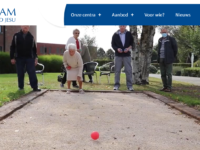The DYPA Career Days, organized by the Public Employment Service (DYPA) in Greece, fosters direct engagement between the business sector and jobseekers. This marks a significant departure for DYPA as these events are now systematically conducted, spanning the entire country. A key strength of DYPA’s Career Days lies in their comprehensive promotion of employment opportunities and the strategic engagement of interested individuals through a process characterized by simultaneous, adaptable, and…
Case Study Library
Where innovations are collected and shared to disseminate and replicate good ideas

Innovations:
0
This website, as well as any data and map included herein, are without prejudice to the status of or sovereignty over any territory, to the delimitation of international frontiers and boundaries and to the name of any territory, city or area.
Case Study
Becoming Agile: a way to deliver high quality products and solve long standing reform challenges in…
To improve the Government's response to problems and delivery of products, the Office of the Prime Minister of Croatia introduced Agile methodology and Agile teams, which mimicked startups in using iterations and learning to inform their next move. All governments have policy challenges that seem too complex to be solved. These challenges span across several departments, have some areas where jurisdiction of departments is unclear, and any intervention would have serious impact on all citizens.
ANII, in collaboration with the private sector and the support of Uruguay's Ministry of Health, is piloting a novel Open Innovation Initiative (MH2030). Ageing populations and rising numbers of people with multiple chronic diseases are placing an increasing burden on health systems. There is a need for improving healthcare by fostering an innovative environment. Through this new co-creative approach, local entrepreneurs work collaboratively with partnering healthcare institutions to tailor and…
The implementation of the OKRs (Objectives and Key Results) methodology in the National Agency on Corruption Prevention (NACP) was developed to address performance management, transparency, and team clarity and coordination issues. OKRs have benefited the organization by providing a structured framework to set, track, and measure objectives, thus improving accountability and goal alignment. This marks the first experience of implementing this approach in the Ukrainian public sector, drawing…
More than 80% of the residents in residential elderly care suffer from unwanted urine loss. This is why care staff check on them regularly, day and night. In order to minimize these disturbing and time-consuming incontinence rounds, the residential care organization Zorg-Saam set out to test new incontinence solutions equipped with sensor technologies that detect when bandages are saturated and alert care staff. With this innovation, supported by the The Programme for Innovation Procurement of…
The UK government launched a new “youth hub” offer of employment services to young people affected by the disruption of the covid-19 pandemic. Through four days of workshops with key stakeholders, which included engaging young people, Impetus ran a theory of change process to enable one of the flagship hubs to co-design their new service to best serve young people. This is the first time that Impetus has applied its theory of change tools, and its impact focus to a government policy…
The UK Government Policy Profession has piloted a new model called Shared Policy Capability Project to support department leaders and policy makers undertake a facilitated self-assessment of their policy environment and identify opportunities for improvement. Through this the government aims to build capability at a department level and enable policymakers to take an active role in improving the environment in which they make policy.
The techDetector is the first technology radar giving an overview of emerging technologies that have the potential to influence the area of sustainable development in the future. It lists future technologies from all sectors of sustainable development and assesses their potential impact on sustainability and gender equality. The techDetector helps inform, sensitize and support foresight processes, enabling better decision-making by providing sound information on technological developments.
The TAP portal is a unique e-government system at the European Union level, which ensures the development of digital government legislation, moving from documents to structured data. The TAP portal ensures the proceedings of the meetings of the Cabinet of Ministers and allows every citizen of Latvia to follow the progress of the Government's decision-making and express an opinion on the regulatory acts being developed by the Government.
The NSW Government has developed a whole of government spatial tool to improve planning and pre-development processes. The tool modernises the traditional approach to strategic planning, site assessment & land use evaluation and provides user friendly access to GIS capabilities where multiple agencies can work together on a project in NSW public sector. Through this, government agencies are enabled to make faster, better informed, more transparent and consistent decisions on NSW land.






